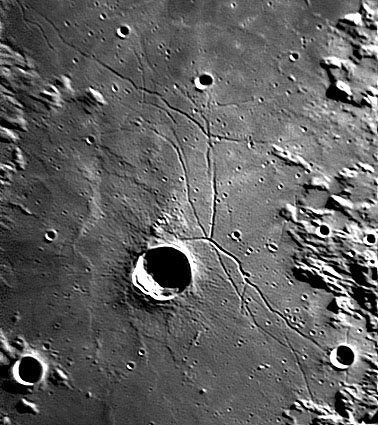Difference between revisions of "May 26, 2004"
| (3 intermediate revisions by the same user not shown) | |||
| Line 1: | Line 1: | ||
__NOTOC__ | __NOTOC__ | ||
=Triesnecker Rilles= | =Triesnecker Rilles= | ||
| + | <!-- Start of content --> | ||
<p align="center"> | <p align="center"> | ||
<table width="640" border="0" align="center" cellpadding="6" cellspacing="2"> | <table width="640" border="0" align="center" cellpadding="6" cellspacing="2"> | ||
| Line 23: | Line 24: | ||
Image obtained Feb 4, 2004 with Celestron C-14, Pentax 1.4x teleconverter, Toucam Pro 740k, Toucam software, Registax 1, 160 frames stacked. Further unsharp mask enhancement by CAW.</p> | Image obtained Feb 4, 2004 with Celestron C-14, Pentax 1.4x teleconverter, Toucam Pro 740k, Toucam software, Registax 1, 160 frames stacked. Further unsharp mask enhancement by CAW.</p> | ||
<p class="story"><b>Related Links:</b><br> | <p class="story"><b>Related Links:</b><br> | ||
| − | [ | + | [http://www.lpi.usra.edu/research/lunar_orbiter/images/img/iv_102_h1.jpg Lunar Orbiter IV View]<br> |
| − | [ | + | [http://www.keithlaney.com/ApolloOrbitalimages/AS10/AS10-32-4819.jpg Apollo 10 Oblique View]</p> |
| − | <p | + | <p><b>Yesterday's LPOD:</b> [[May 25, 2004|A Grand New Lunar Atlas]] </p> |
| + | <p><b>Tomorrow's LPOD:</b> [[May 27, 2004|The Jura and a Missing Rim]] </p> | ||
</tr> | </tr> | ||
</table> | </table> | ||
| Line 39: | Line 41: | ||
<!-- Cleanup of credits --> | <!-- Cleanup of credits --> | ||
<p> </p> | <p> </p> | ||
| − | + | <!-- End of content --> | |
| − | + | {{wiki/ArticleFooter}} | |
| − | |||
| − | |||
| − | <!-- | ||
| − | |||
| − | |||
| − | |||
| − | |||
| − | |||
| − | |||
| − | |||
Latest revision as of 21:37, 8 February 2015
Triesnecker Rilles
Image Credit: Tom Leech |
|
Triesnecker Rilles Most rilles fall into one of three categories: sinuous, linear or arcuate. But the rilles near Triesnecker don't. As this high resolution view by Tom Leech demonstrates they are mostly narrow and straightish with some tight curves. The NW-SE trending rille segments are approximately radial to Imbrium, but the N-S and E-W segments aren't. The rilles are not associated with overtly volcanic features such as domes or Cobra Head-like collapse pits. These are unusual, maybe unique rilles. Ejecta from Triesnecker appear to cover the rilles, which must thus be older than that crater. Because some of the rilles cut across other ones there must be an age progression; in general the thinner rilles seem to be older than the wider, more pronounced ones. If these razor thin rilles, like larger linear ones, are surface expressions of igneous dikes, they would have had to be very close to the surface. This is the place in an LPOD writeup where I often provide an explanation, but I don't know why these rilles are here! Technical Details: Related Links: Yesterday's LPOD: A Grand New Lunar Atlas Tomorrow's LPOD: The Jura and a Missing Rim |
Author & Editor:
Charles A. Wood
COMMENTS?
Register, Log in, and join in the comments.




